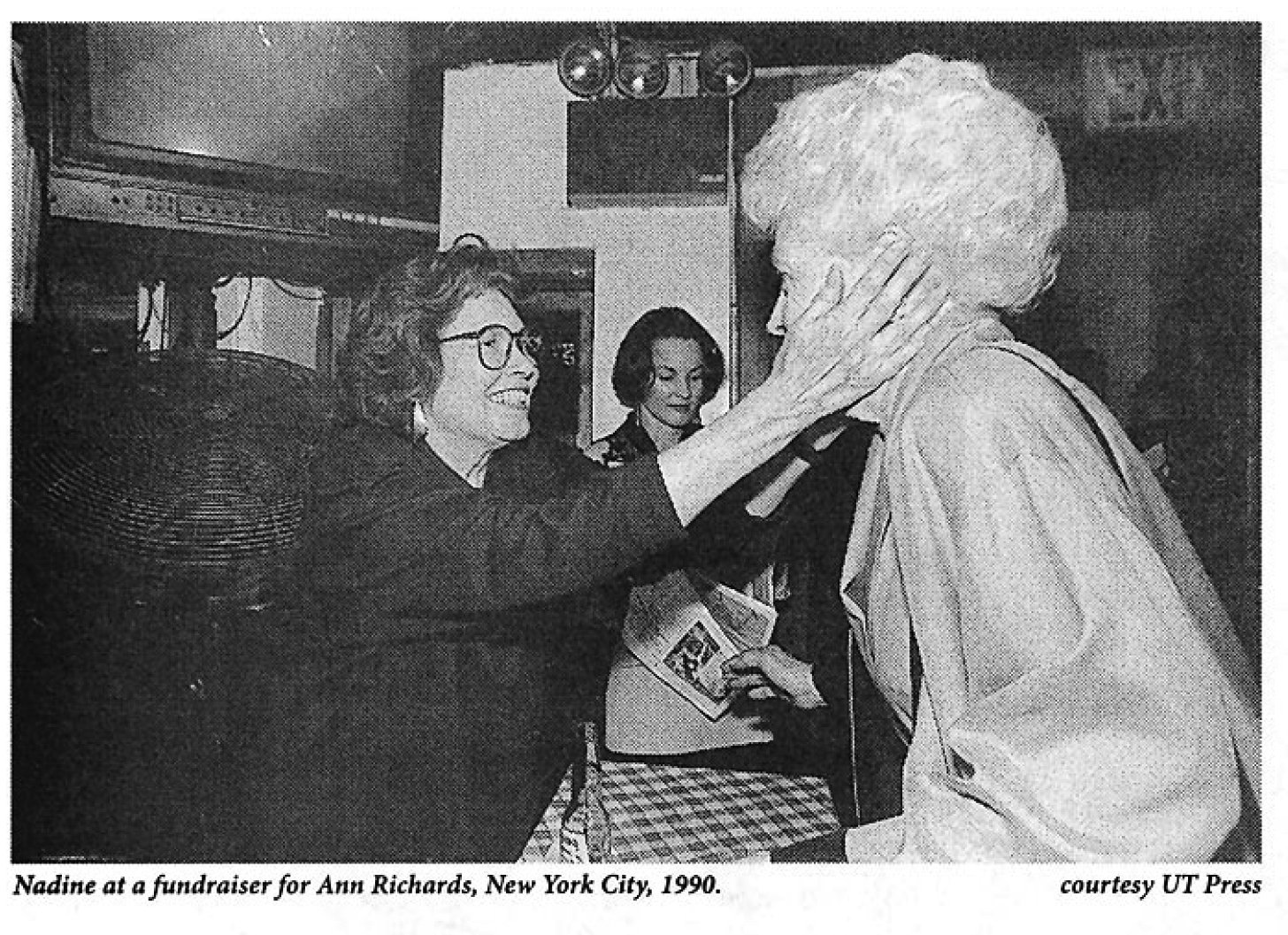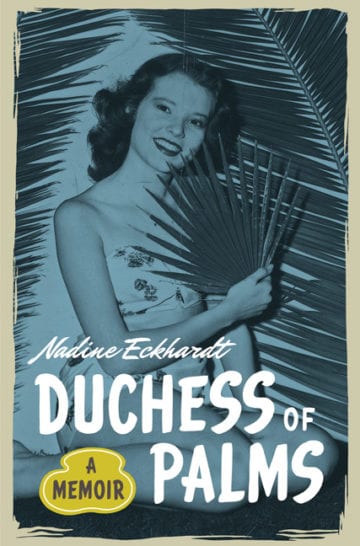
Remembering Nadine Eckhardt (1931-2018)


Editor’s note: Legendary Austinite and politico Nadine Eckhardt died Saturday, December 8, 2018, at age 87. As Robert Leleux wrote in his review of her memoir, Duchess of Palms, if Billy Lee Brammer’s The Gay Place is “Austin’s Arthurian legend, then she [was] its Guinevere.” His review, below, was originally published by the Observer in 2009.
Though Eckhardt is oft-noted for her marriages to famous men — including Brammer and, later, Congressman Bob Eckhardt — she also worked as an assistant to Molly Ivins and LBJ, and campaigned for Ann Richards. Her daughter, Sarah Eckhardt, is the first female Travis County judge.
Her memoir, Leleux noted, functions as “an extraordinary work of women’s history, offering a candid consideration of the wifely role in politics during a pre-women’s movement era when ‘wife’ was the best job in town for a woman with political ambitions.”
Read an excerpt from Nadine Eckhardt’s memoir Duchess of Palms.
ORIGINAL POST: No time or place in Texas history has been more fervently mythologized than the Austin of the 1950s and early ’60s. To a bevy of Bright Young Men, the city then boasted something better than cheap rents and easy virtue. It was a mucho macho moment when liberalism seemed virile instead of bleeding-heart, when a man could be progressive without being called a pansy. Little wonder, then, that published accounts of this era tend to include so few women, at least from the neck up. But those that do tend to mention Nadine Eckhardt.
If The Gay Place is Austin’s Arthurian legend, then she’s its Guinevere — the red-hot redhead of a million Scholz Garten nights, who married not just Austin’s Dark Poet (Billy Lee Brammer) but its Crown Prince (Bob Eckhardt) as well. The problem with this story, at least so far as it regards Nadine Eckhardt, is that she was always more than a Sweater Girl. As her new memoir, Duchess of Palms, reveals, Eckhardt was the catalyst, rather than the mere consort, of these two brilliant men. Her intellect and oomph helped transform their latent, eccentric talents into dazzling accomplishments.
In her preface, Eckhardt describes Duchess of Palms (the title refers ironically to the author’s beauty-queen past) as a memoir of “two marriages to two semi-famous Texas men.” In the most limited sense, that’s accurate. But Duchess of Palms is also an extraordinary work of women’s history, offering a candid consideration of the wifely role in politics during a pre-women’s movement era when “wife” was the best job in town for a woman with political ambitions.

By Nadine Eckhardt
University of Texas Press
$29.95; 176 pages
Just what kind of political ambitions Nadine Eckhardt had is difficult to say. She is, in general, a very tricky woman to categorize. “I’m a compulsive moderate,” Eckhardt told me last November in her Austin bungalow — which is a much better description than it sounds, since hers is a personality that seems at ease combining clashing characteristics. “A few weeks ago, I looked up my birthday in The Book of Days. You know that book? Anyway, it turns out I was born on the Day of the Freewheeler. For whatever that’s worth. But then, I also looked up Barack Obama, and he was born on the Day of the Guiding Light, so who knows?”
Eckhardt does seem freewheeling, possessing (at 77!) an almost rock’n’roll vigor and sex appeal. She looked impossibly young on that soft November evening, all wide eyes and bouncy red bangs — features that, I’m sure, have often distracted men from noticing her stiletto mind. Robert Caro, interviewing her for his celebrated LBJ biography, reportedly called her the most perceptive person he’d ever spoken to regarding Lyndon Johnson. Her home is bohemian but orderly, and rafter-packed with paintings and sculpture of herself (gifts from her many admirers). Despite this, Eckhardt seems to have developed the indifference toward good looks of a woman who’s grown bored with being a beauty. When I remarked on a particularly lovely bust, for instance, set on a low shelf near the kitchen, she said, “Yeah, I loved that one. But then the nose snapped off during a move. So I called the artist to see if he could stick on a new nose. But he said there wasn’t any way to do it without it looking like the old nose snapped off, and you tried to stick on a new nose on. Hmph,” she said, with a shrug of her shoulders. It’s a characteristic gesture. Her whole attitude seems to declare, “Noses snap off; marriages bust up; life goes on.” It’s a forward-looking outlook that almost certainly accounts for Eckhardt’s youthfulness — and probably also for her interest in politics, which she defines as just “hanging out” with people. Talking over cold drinks at her dining table, I began to think of her political ambition as a desire to satisfy her natural curiosity, her liaisons with prominent artists and politicians as a way of engaging the world.
In April of 1950, when Nadine Cannon married Billy Lee Brammer, she may have been a green 19-year-old from dusty McAllen, but she was also one of those strangely visionary young people whose instincts surpass their experience. Though she’d never met a famous novelist, she knew that with her help Brammer would become one. During the early years of their marriage, years filled with high times and low bank balances, the stylish couple became Austin’s F. Scott and Zelda Fitzgerald. On staff at The Texas Observer, Billy Lee began reporting events (like the filming of Giant) he’d eventually fictionalize and weave into The Gay Place. The crystallizing moment of their young lives came in early 1955: “The Senator,” as the Brammers came to call LBJ, had a fondness for hiring couples. First he put them on the payroll and then on a Brown & Root plane headed for Washington.

In a move straight out of Stendhal, these two provincial youths were thrust into the nation’s power circles, receiving an incomparable education that would determine the divergent courses of their later lives. Billy Lee’s fate is notorious: After spending time as one of Lyndon’s “hard-peckered boys,” he transformed “The Senator” into fiction, creating a portrait of LBJ in The Gay Place that would prove the simultaneous debut and climax of his writing career. For Nadine, however, her apprenticeship with the Johnsons was only the beginning.
LBJ’s most obvious motive for hiring young couples was to leverage control over his staff — his boys could work late nights without their wives complaining. But Johnson also arguably viewed “the couple” as the basic unit of political success, due to his long partnership with the tireless Lady Bird. The opportunity to observe Lady Bird was formative for Nadine. From her example, the future Mrs. Bob Eckhardt learned that “effective political wives are much like first-rate executives.” Watching from the proximity of the Johnsons’ secretarial pool, Nadine noticed that “like her husband, Lady Bird worked constantly … she desired power just as much as he did. Theirs was a creative relationship that served to accomplish their goals for money and political power.”
It was the idea that marriage could be a “creative relationship,” a mutual adventure, that Eckhardt seems to have found particularly stimulating — poignantly so, since by the 1961 publication of The Gay Place, she and Brammer had drifted apart. They divorced in June of that year. And as Billy Lee entered a distinctly ’60s spiral into speed and Gonzo journalism, Nadine retreated to Austin. There she found work in the Capitol, and in the following months began a whirlwind romance with Bob Eckhardt, then a crusading state representative with unmistakable potential.
From the start, Nadine’s attraction to Eckhardt seems to have been a mélange in which love and politics were inextricably bound. She saw in him an ideal partner for the kind of “creative relationship” she’d witnessed between LBJ and Lady Bird. Of her decision to marry Eckhardt in 1962, Nadine writes:
My vision was so compelling and my gut instinct so certain, I decided I would marry this mature, attractive, talented man, create a wonderful home, help him achieve a congressional seat, and return to Washington as a congressional wife. Consciously, I was marrying Bob because I loved him and wanted to help him in his political career. Subconsciously, I think I was the one who really wanted to go to Congress.
The discrepancies between their political drives (Bob Eckhardt, though a brilliant legislator, found the process of getting elected degrading, while Nadine thrived on organizing and campaigning) seemed, at first, to make them a perfect match. By 1966, Bob was elected to Congress from Texas’ 8th District. Arriving in Washington, the couple was warmly welcomed by now-President Johnson and the First Lady — who, as a matter of taste, never acknowledged that their new colleague’s wife was also their former secretary. For a while, the bustle and flurry of Washington, its parties and talk, was exhilarating. But by the early ’70s, the Eckhardts’ marriage was showing signs of strain.
There is no question that, as a congressman, Bob Eckhardt belongs to a sparsely populated pantheon of truly commendable Texas politicians. But as a husband, forget about it. When it came to crafting legislation, he was a genius. When it came to doing laundry, it was a whole other story. He could debate the fine points of tax policy, but ask him to balance his checkbook and the poor man just crumbled. Of his tendency toward abstraction, Molly Ivins once wrote: “He was absolutely not worth dog on any kind of practical aspect of life. If he had not been taken care of by good women all his life, he’d have been totally nonfunctional.” During his rise to national prominence, it was Nadine who took care of Bob Eckhardt.
It was Nadine who “made decisions when the staff couldn’t get an answer from Bob” and “remembered the names of the people who were key to his success and entertained constituents.” And it wasn’t the burden of caretaking, per se, that was Nadine’s real problem with the relationship. It was that if she’d modeled her second marriage on the Johnsons’, she was destined for disappointment, because Bob Eckhardt, to his moral credit, was no LBJ. Whereas Lyndon lived for acclaim and power and money, Bob just wanted to be left alone with the law. LBJ valued Lady Bird’s discreet, tactful efforts because he understood their necessity to his career. But Eckhardt seemed blind to the politicking Nadine did on his behalf. Or even worse, he saw it as something useful but of no particular value, like doing the laundry. “He couldn’t change,” Nadine writes. “I lost patience with his helplessness and after years of being a wife/staffer, I lost respect for him. Actually, it was more complicated than that. I was losing respect for myself for putting myself in such a position.”
The position in which Nadine found herself was captured succinctly by journalist Myra MacPherson in 1975’s The Power Lovers: An Intimate Look at Politicians and Their Marriages, a book that would cause considerable mischief for the Eckhardts upon its publication. Here MacPherson recounts a particularly frank (and awkward) exchange between the two:
The talk shifted to political wives; [Bob Eckhardt joked] that the best campaigners are those who are ‘simply not engaged in helping the opposition. I’m inclined to think a man alone in a campaign would be better.’ Surprising to his audience, he said that a nice, warm, friendly wife with no ambition or ideological bent can often make the best political wife.
Nadine was sitting quietly, but hardly containing herself. She is a strong personality, vivacious, with a strong ideological bent, reads politics avidly, discusses it avidly, and has an avid opinion. When Eckhardt mentioned one ‘perfect’ wife who ‘loved’ politics and fit the pattern he had just described, Nadine asked with a shade of innocence, ‘Why is she perfect?’ ‘Because she does it so well.’ She replied, ‘Well, “good, supportive” wives are not necessarily happy.’
He seemed somewhat perplexed at the interjection of the word ‘happy’ into the conversation. ‘I didn’t say they were happy — I said they were tremendous assets.’ She said, ‘I don’t think they are really assets. Did you ever see her really smile? Did you ever see her happy?’ He said, ‘I’m not talking about happy, honey, but about assets.’
If Bob Eckhardt wasn’t LBJ, Nadine was no Lady Bird. She didn’t have a temperament suited for hero worship or public humiliation — both helpful character traits for Washington wives. In another passage, MacPherson quotes Nadine as saying, “Those wives don’t even realize their egos are suffering. It’s a kick to have people say, ‘What a speech you gave,’ instead of, ‘Oh, I think your husband’s wonderful.’ I answer that I think he is too, but I also feel, holy hell, so am I.” Unlike Lady Bird, access to power and money appears never to have motivated Nadine. And though for a while she’d enjoyed working as Bob’s campaign partner, she was beginning to feel exploited. If her choice truly was, as her husband related it to MacPherson, between being a supportive wife and being a happy person, then Nadine would pick happy. Newly influenced by the civil rights and feminist movements, she suddenly found herself unwilling to devote all her talents to a man who didn’t appreciate them. When the Eckhardts separated in 1976, Nadine predicted that without her help Bob would be voted out of office within four years. In 1980, he was.
It’s at this point that Duchess of Palms becomes most compelling — because for Nadine, the breakup of her second marriage prompted one of those come-to-Jesus moments that call into question a lifetime of decision-making. She began to see parallels between her current predicament and her divorce from Bill Brammer 15 years earlier:
We separated when [Bob] was at the peak of his career, just as Bill and I had separated at the point when The Gay Place was being published. I left each marriage at the time that each husband was reaping the rewards of our mutual dedication and hard work. I didn’t know how to achieve for myself, only for others, and I felt ripped off and empty.
Like so many of the “fifties girls” to whom Eckhardt dedicates her book, she realized she’d spent the first half of her life ricocheting between her conflicting desires for security and freedom. For Nadine, unlike so many of those girls, freedom won. The chance to start over was worth walking away from a safe marriage with less than her share. In The Power Lovers, Bob Eckhardt is quoted as groaning “Oh, my God” when Nadine suggests that “every congressional wife should get a pension.” But while their 1977 divorce settlement seems to have split the Eckhardts’ real estate fairly, the property in which the couple had built the most equity was his congressional seat — and that couldn’t be divvied up in divorce court. Like any politician’s wife with a passion for politics, Nadine didn’t just lose a husband when she divorced Bob Eckhardt, she also lost a flourishing career. As her ex-husband’s congressional seniority increased, her own résumé came up empty, her years as Mrs. Bob Eckhardt technically amounting to a lapse in work experience. There was a sense of being put out to pasture in her prime. But however unjust Nadine found this bargain, it was nonetheless worth it. During our visit last November, she insisted: “I saw the way those wives were living up in Washington, and so many of them were miserable. Well, I realized I wasn’t willing to be miserable. I had a taste of that life, and I didn’t want any part of it.”

“I didn’t mind working for either of my husbands,” she told me. “But whenever I realized I was working harder than they were, I got bored fast.” Since divorcing Bob Eckhardt, Nadine’s life seems to have been dizzy with work — on her own behalf, and for notably appreciative audiences. She campaigned for Ann Richards, worked as Molly Ivins’ assistant and helped run Nadine’s, the New York City restaurant her daughters named in her honor. She formed friendships with both her ex-husbands that seem to have been far more satisfying than their married relationships. Her bond with Eckhardt, in the years before his death in 2001, is especially touching.
But it’s the 2006 election of their daughter, Sarah Eckhardt, to the Travis County Commissioners Court that serves as the happy ending to Duchess of Palms. Speaking proudly of Sarah’s political future, the ailing former congressman was finally able to recognize the strength of his and Nadine’s combined talents. “Not long before he died,” Nadine writes, “[Bob] looked me hard in the eye and said, ‘Sarah got the best of you and the best of me and she would make a good legislator.'”
The manuscript of Duchess of Palms amounts to its own happy ending. For a woman whose accomplishments have so often been tantamount to ghostwriting — hard work for which she was never credited — this memoir, almost 10 years in the writing, is a strikingly individual achievement. Its upcoming publication (scheduled for March by the University of Texas Press) seems to have made past sacrifices worthwhile. As Nadine walked me to her door, I noticed a bookshelf filled with various editions of The Gay Place. Seeing them, I was reminded of an obvious question I’d forgotten. “So, in the book, the character Ouida. That’s you, right?”
“Yeah,” Nadine said, her eyes firing. “That’s me.”
“Did that bother you?”
“At the time, it did. Because I felt like Bill took my life, my stories, and put them in his book. But you know, now, so what? Now, I am over it.”
Robert Leleux is a Texpat living in New York City. His first book, The Memoirs of a Beautiful Boy, is newly available in paperback from St. Martin’s Press.


